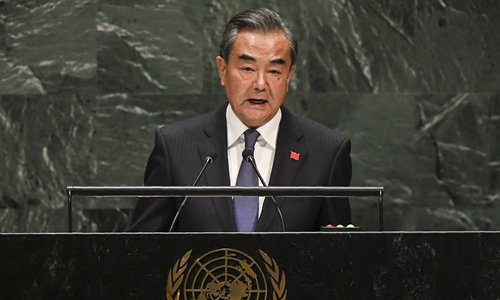HOME >> OPINION
FM offers insights into China’s growth philosophy
Source:Global Times Published: 2019/9/28 22:38:40

Chinese State Councilor and Foreign Minister Wang Yi addresses the United Nations General Assembly at UN headquarters on Friday in New York City. Photo: AFP
Chinese State Councilor and Foreign Minister Wang Yi delivered a speech entitled "China Today: A Proud Member of the Global Community" on Friday at the General Debate of the 74th Session of the UN General Assembly. As the 70th anniversary of the founding of the People's Republic of China (PRC) brings global attention to China, Wang's speech has provided loads of authoritative information for the world to understand China.
China's national character is shaped by many historical and real-world factors. The country "is guided by the principle of independence," "believes in equality among nations," "stands for equity and justice," and "pursues mutually beneficial cooperation." All the above principles Wang mentioned represent the nation's pursuit, which was once mired in poverty, backwardness and bullies. It is also the way the country heads toward prosperity. It is because China has been doing so that its path has increasingly widened.
Developing countries generally hate unilateralism. So do quite a few developed countries. But some countries tend to submit to more powerful forces and dare not complain about their unfair treatment. Wang articulated, "To put one's own interests above the common interests of all other countries is a typical bullying practice that finds no support from the people." Such righteous statements are welcomed by the UN General Assembly. The voice of justice is exactly what the world needs when power politics rages across the globe.
The 70-year-old PRC has been pursuing the dream that has significance for developing countries. It is eager to be independent, yearns for economic progress, attaches great importance to political stability, and eyes integrating with the world. Achieving them is not easy for developing countries. China's success has thus attracted worldwide interest.
Western elites once predicted that China would not be able to feed its huge population, and that China would become a major humanitarian problem. However, China has not only built a moderately prosperous society on its own, but has also provided the world with more and more driving forces of development. China, as the largest society in the world, has not become a burden to mankind's advancement, but has become a new development engine.
Western international relations practice states that "power leads to hegemony." But China, which has become the world's second largest economy, has shown no interest in seeking hegemony. China has not been involved in any war for over 30 years. It emphasizes negotiations when it comes to disputes. No emerging power in history has shown the restraint China has.
China has its unique ideology, which has been supporting its rapid development. After China became strong, it never exported its ideology. The country remains humble as always.
Wang stressed that "permanent members of the Security Council need to lead by example, as major countries shoulder special responsibilities for maintaining a stable international order." All major countries should share the spirit, instead of showing off their so-called patriotism in the UN, encouraging competition and conflicts among patriotism from different nations.
This is the 21st century; certain major power is not supposed to be egoistic and a bully while being proud of it.
Posted in: EDITORIAL